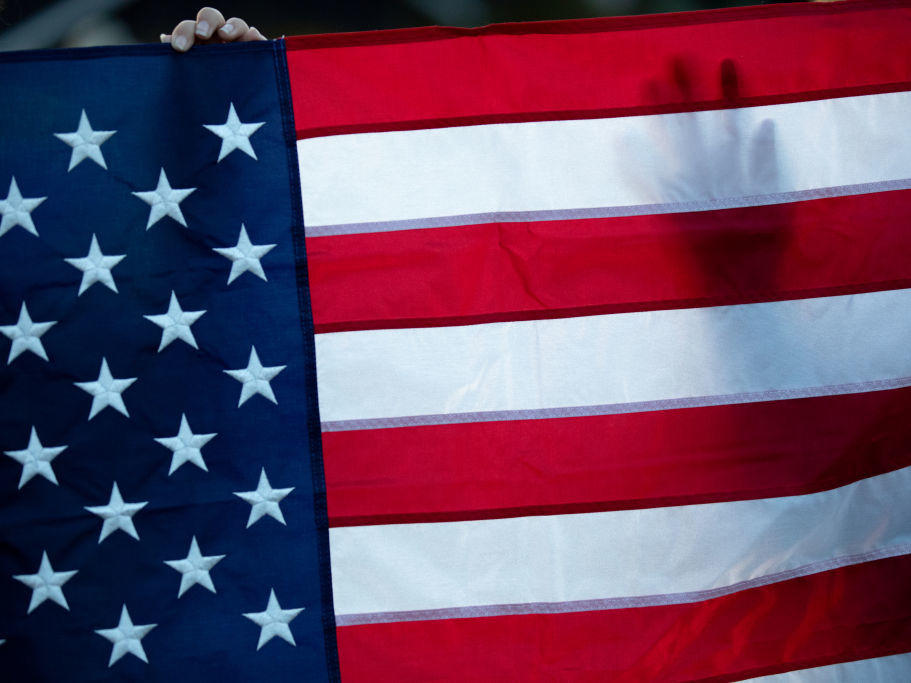Section Branding
Header Content
Americans Worry About Transfer Of Power: 'We Need Our Country To Come Together'
Primary Content
As President Trump still refuses to accept his election defeat, Travis Goodman finds himself gaming out what kind of "power grab" the outgoing president could stage, from continuing to contest the results to trying to disrupt the Electoral College process.
"I'm full of anxiety all the time," said Goodman, an accounting clerk at a manufacturing firm in Goshen, Ind. "These institutional norms where I was told to go get a job and a 401(k) full of money so you can retire, you know, and live a decent happy life — is there going to be a boiling-over point where these things don't matter?"
During this rocky presidential transition, NPR asked Americans how the nation can move forward. More than 600 people weighed in, many citing fears about the future of U.S. democracy and apprehension about a lame-duck Trump presidency and the transition to Joe Biden's administration.
Some respondents expressed fear about Trump trampling democratic norms, while others trusted the election process but feared lasting political extremism. People also shared ideas for how to overcome the discord and improve the system — from bolstering voting infrastructure and abolishing the Electoral College to addressing the problem of misinformation and regulating social media.
Nearly two weeks after Biden clinched enough electoral votes to win the presidency, Trump continues to pursue legal battles — even after many claims have been tossed out of court — and to falsely insist there was widespread fraud.
Some Republicans have acknowledged Trump's defeat and that recounts are unlikely to change the outcome, but Trump surrogates, including Rudy Giuliani, continue to push baseless conspiracy theories about a rigged election.
Many people told NPR they worry about the impacts of a contentious transition. Already, Trump has denied Biden security briefings and has thrown up roadblocks preventing his transition team from accessing millions of dollars in transition funding.
"He's going to have to leave. It's just a matter of is he going to do it with any sort of dignity whatsoever," said Lisa Stafford, a high school teacher in Saginaw, Mich. "It's going to be a mess in January. It's not going to be a smooth transition like it should be."
Despite widespread division, Stafford believes there is "a genuine middle ground."
"Most people that I know, Republican or Democrat, are in that middle ground," said Stafford. "It doesn't seem like the parties at this point, Democrat or Republican, can keep a middle ground where we're supposed to work together toward a future."
Many Americans lamented divisions along political, racial and other lines, telling NPR they aren't sure how the nation can come together.
Several people put the onus on Democrats and an incoming Biden administration, criticizing what they called a lack of civility from Democrats and bias from left-leaning media.
"I mean nobody is blameless, but I would say over the last four years the major drivers of division came from Democrats. They were relentless in pounding on Trump and his supporters," said Bruce Hutchins, a Republican from Florida.
Hutchins, a retired public financial management specialist who voted for Trump, isn't optimistic there is a path out of the divisiveness but points out that Democrats — not Republicans — are the ones talking about reconciling differences.
"Democrats are seeing themselves as the winners, obviously, in this election, and they're the ones asking for reconciliation," said Hutchins. "So if that's what they really want to do, they have to take steps to alleviate the distrust Republicans have of them right now."
Alberto Filipponi, a high school teacher in Lombard, Ill., believes that the Biden administration needs to make concessions for Trump supporters and give them room to voice policies they support.
"I think one of the ways you can heal the nation is just by taking out the extremes on both sides," said Filipponi. "I feel like Joe Biden is someone who can do that."
Still, Filipponi continues to feel disconnected from Trump supporters in his own life.
"Some people supported things that I just personally found so contrary to what I believed, that a good human being should believe," he said. "The racism, the misogyny, the lack of consideration for other people's feelings and not just feelings but lives. It's not acceptable for a president, and for me it's not acceptable for a friend."
Several Americans told NPR they're also concerned about what they consider Trump's authoritarian leanings and the possibility his presidency will culminate in violence or an illegitimate power grab.
"It's not a given that this will occur," said Rohan Hunt, a woodworker who lives in Philadelphia. "But I think he's sent clear signals that he's prepared to go as far as encouraging armed insurgency to have his own way."
While not all fear an election steal, many Americans noted that four years under Trump have amplified differences on a range of issues.
"We need our country to come together," said Jean Beinemann, a retired public health nurse in Sheboygan, Wis., "where individuals reach across the aisle and agree that we are all in this together. And there has to be give-and-take for an orderly and peaceful transition to occur."
For some, like Beinemann, the arrival of a Biden administration raises hopes for a return to some amount of normalcy and the chance to start a new chapter.
She quoted the late Supreme Court Justice Ruth Bader Ginsburg, who once said in reference to the gridlock of partisan politics, "enough of this nonsense" and urged politicians to work together.
"Enough of this nonsense," Beinemann said. "Let's move together to ensure a safe transition."
Piper McDaniel is an intern on NPR's National Desk.
Copyright 2020 NPR. To see more, visit https://www.npr.org.

